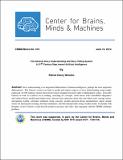| dc.contributor.author | Winston, Patrick Henry | |
| dc.date.accessioned | 2015-12-10T23:25:57Z | |
| dc.date.available | 2015-12-10T23:25:57Z | |
| dc.date.issued | 2014-06-10 | |
| dc.identifier.uri | http://hdl.handle.net/1721.1/100183 | |
| dc.description.abstract | Story understanding is an important differentiator of human intelligence, perhaps the most important differentiator. The Genesis system was built to model and explore aspects of story understanding using simply expressed, 20-100 sentence stories drawn from sources ranging from fairy tales to Shakespeare’s plays. I describe Genesis at work as it reflects on its reading, searching for concepts, reads stories with controllable allegiances and cultural biases, models personality traits, answers basic questions about why and when, notes concept onsets, anticipating trouble, calculates similarity using concepts, models question-driven interpretation, aligns similar stories for analogical reasoning, develops summaries, and tells and persuades using a reader model. I conclude with thoughts on how Genesis would describe people in pictures and video, thus engaging with the CBMM challenge problem. | en_US |
| dc.description.sponsorship | This work was supported, in part, by the Center for Brains, Minds and Machines (CBMM), funded by NSF STC award CCF - 1231216. | en_US |
| dc.language.iso | en_US | en_US |
| dc.publisher | Center for Brains, Minds and Machines (CBMM) | en_US |
| dc.relation.ispartofseries | CBMM Memo Series;019 | |
| dc.rights | Attribution-NonCommercial 3.0 United States | * |
| dc.rights.uri | http://creativecommons.org/licenses/by-nc/3.0/us/ | * |
| dc.subject | Story Understanding | en_US |
| dc.subject | Artificial Intelligence | en_US |
| dc.subject | Language | en_US |
| dc.subject | Computer Language | en_US |
| dc.title | The Genesis Story Understanding and Story Telling System A 21st Century Step toward Artificial Intelligence | en_US |
| dc.type | Technical Report | en_US |
| dc.type | Working Paper | en_US |
| dc.type | Other | en_US |
